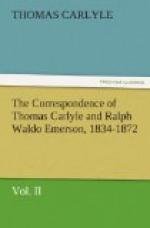Clough is here, and comes to spend a Sunday with me, now and then. He begins to have pupils, and, if his courage holds out, will have as many as he wants.... I have written hundreds of pages about England and America, and may send them to you in print. And now be good and write me once more, and I think I will never cease to write again. And give my homage to Jane Carlyle.
Ever yours,
R.W.
Emerson
CLII. Carlyle to Emerson
Chelsea, 13 May, 1853
Dear Emerson,—The sight of your handwriting was a real blessing to me, after so long an abstinence. You shall not know all the sad reflections I have made upon your silence within the last year. I never doubted your fidelity of heart; your genial deep and friendly recognition of my bits of merits, and my bits of sufferings, difficulties and obstructions; your forgiveness of my faults; or in fact that you ever would forget me, or cease to think kindly of me: but it seemed as if practically Old Age had come upon the scene here too; and as if upon the whole one must make up one’s mind to know that all this likewise had fallen silent, and could be possessed henceforth only on those new terms. Alas, there goes much over, year after year, into the regions of the Immortals; inexpressibly beautiful, but also inexpressibly sad. I have not many voices to commune with in the world. In fact I have properly no voice at all; and yours, I have often said, was the unique among my fellow-creatures, from which came full response, and discourse of reason: the solitude one lives in, if one has any spiritual thought at all, is very great in these epochs!—The truth is, moreover, I bought spectacles to myself about two years ago (bad print in candle-light having fairly become troublesome to me); much may lie in that! “The buying of your first pair of spectacles,” I said to an old Scotch gentleman, “is an important epoch; like the buying of your first razor.”—“Yes,” answered he, “but not quite so joyful perhaps!”—Well, well, I have heard from you again; and you promise to be again constant in writing. Shall I believe you, this time? Do it, and shame the Devil! I really am persuaded it will do yourself good; and to me I know right well, and have always known, what it will do. The gaunt lonesomeness of this Midnight Hour, in the ugly universal snoring hum of the overfilled deep-sunk Posterity of Adam, renders an articulate speaker precious indeed! Watchman, what sayest thou, then? Watchman, what of the night?—




